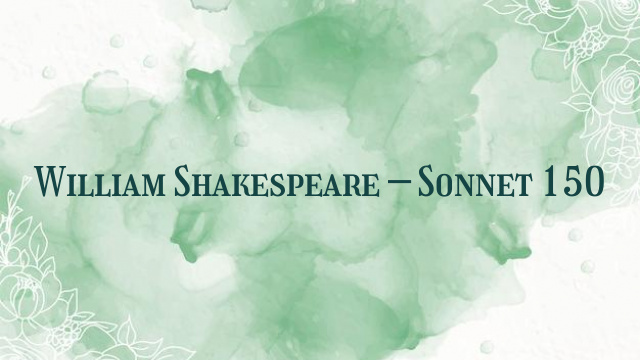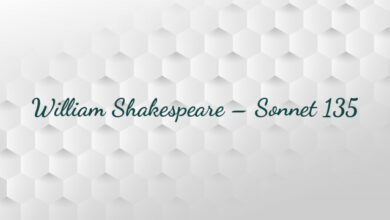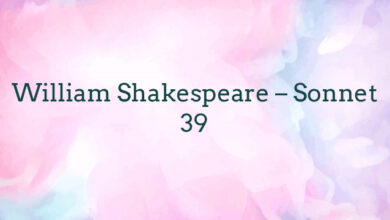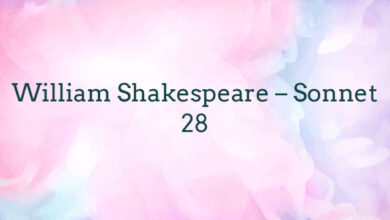
William Shakespeare – Sonnet 150
O! from what power hast thou this powerful might,
With insufficiency my heart to sway?
To make me give the lie to my true sight,
And swear that brightness doth not grace the day?
Whence hast thou this becoming of things ill,
That in the very refuse of thy deeds
There is such strength and warrantise of skill,
That, in my mind, thy worst all best exceeds?
Who taught thee how to make me love thee more,
The more I hear and see just cause of hate?
O! though I love what others do abhor,
With others thou shouldst not abhor my state:
If thy unworthiness raised love in me,
More worthy I to be beloved of thee.
There is little doubt that this sonnet covers the same ground as that traced in sonnet 116
Let me not to the marriage of true minds
Admit impediments. Love is not love
Which alters when it alteration finds,
Or bends with the remover to remove:
This may seem a piece of gratuitous blasphemy to those who have read both sonnets, but a short consideration of the similarities might occasion a change of mind. Firstly I draw attention to the echo from the marriage service in line 10, Therefore, if any man can show any just cause why they may not lawfully be joined together, let him now speak, or else here after forever hold his peace. The whole sonnet is seeking a just cause as to why his love should not continue, just as 116 sought to overcome impediments to the eternity of loving, the mere baggage of time being one of them. It would not be a just criticism if we chose to recognise the links to the marriage service in 116 (which is after all only provided by the word ‘impediments’) and yet decided to ignore those same links in this sonnet, which also is exploratory of the nature of love. For the text from the relevant part of the marriage service of the 1559 Book of Common Prayer is as follows:
Therefore, if any man can show any just cause why they may not lawfully be joined together, let him now speak, or else here after forever hold his peace.
And from this sonnet:
The more I hear and see just cause of hate Line 10
Here however the impediments appear to be more serious at first sight, the moral blackness and moral ugliness of the beloved being the most serious obstacles to a continuation of love. But why, one might ask, why should the unworthiness of the loved one be the cause of cancelling one’s bond, as if the need for it to exist can disappear as soon as one discovers that the object loved has altered from what one supposed it first to be? For if one accepts such an argument, that love may alter when it alteration finds, then love becomes merely a mercenary transaction, and a more fitting place for it is the tradesman’s mart, and not the churches of Christendom. And that is precisely what 116 sought to deny. Now, when confronted with an embodiment of 116’s postulated eternal love, how is the lover going to respond?
One of the differences between this sonnet and 116 is that this one is framed as a series of questions, to which there appear to be no answers, whereas 116 is a series of declarations, positive and almost oratorical, but which in the final analysis cannot be substantiated. Another telling difference is that 116 deals with love as a sort of abstraction, whereas this sonnet deals with love for a particular person, who turns out not to be quite as ideal as the ideal of love demands. Therefore one is thrust back on the defensive, seeking to define what are the true limits of love and to discover if it has a terminus beyond which one should not go. The three questions raised in this sonnet, What power?, Whence? and Who? seem to invite only two possible answers, Cupid, the blind God who is the power of love, or Satan, and the powers of darkness, a somewhat terrifying choice. And what is more, the love here depicted is more insistent and inescapable than that in 116, partly because it has a sexual motive force, partly because of its own mysterious regenerative force, which defies all reason. The former sonnet perhaps too complacently supposed that the love which would last for all time would be a mutual love. Here the horrifying reality emerges that despite his self sacrificing love for the woman he desires, the poet achieves nothing and he is not loved in return, so the ‘eternal love in love’s fresh case’ looks decidedly limp and deformed, with only one side considering it to be love at all, and the other party being entirely indifferent to what is happening. It is the tragedy of this renunciation which brings on his frenzied loving and the insistent series of questions and accusations which inform and shape this painfully raw group of sonnets.
Note that the other places where Shakespeare uses ‘just cause’ deal either directly or indirectly with marriage. In the Henry IV episodes it is the marriage of Henry to his realm. (Elizabeth often spoke of being married to her subjects). In Much Ado the subject discussed is Beatrice’s love for Benedict, and in the Winter’s Tale Leontes discusses re-marrying. The likelihood of this phrase being used as part of common speech, for example, and having little special significance, is difficult to decide. The entire King James version of the Bible does not use the phrase at all, nor is it common in the plays. (See opposite). Shakespeare uses ‘just’ and ’cause’ in close proximity in four other places, listed opposite. The words obviously have legal significance, and in the Henry IV and Henry V episodes they relate to the idea of a ‘just war’. On the whole it seems unlikely that Shakespeare would have been unaware of the signifcance of the phrase ‘just cause’, since virtually all marriages took place in Church, (his own included), his daughter married in 1607, and echoes from the marriage service are readily admitted for sonnet 116. See the additional notes at the end of the page for the texts referred to.
One should also consider the supreme irony of placing this one-sided debate in the setting of a marriage ceremony, for, as sonnet 152 shows, the final sonnet of the dark lady series, the love affair involves the breaking of marriage vows. It is as if the poet is appealing to a higher court, the court of a deity more just than blind Cupid, a deity, whoever it might be, who recognises the eternal commitment which transcends all limited human values. The fact that the appeal is made to this court on behalf of a love for a woman whom the poet considers at times to be little better than a whore, adds a dimension to the sonnets which in the end diverts attention away from the immediate words and forces us to look back into ourselves, to consider the deeply perplexing question of what is love and why does it bring us to the edge of the abyss? For the series of insistent questions turn out to be almost of a biblical character, a cry against injustice and sorrow, as when Job appeals to his maker:
Why hast thou set me as a mark against thee, so that I am a burden to myself?
And why dost thou not pardon my transgression, and take away my iniquity? For now shall I sleep in the dust; and thou shalt seek me in the morning, but I shall not be. Job.7.20-1.
What is man, that he should be clean? and he which is born of a woman, that he should be righteous? Job.15.14.
Or as the final despairing cry from the cross:
My God, my God, why hast thou forsaken me? Matt.27.46.
The 1609 Quarto Version
OH from what powre haſt thou this powrefull might,
VVith inſufficiency my heart to ſway,
To make me giue the lie to my true ſight,
And ſwere that brightneſſe doth not grace the day?
Whence haſt thou this becomming of things il,
That in the very refuſe of thy deeds,
There is ſuch ſtrength and warrantiſe of skill,
That in my minde thy worſt all beſt exceeds?
Who taught thee how to make me loue thee more,
The more I heare and ſee iuſt cauſe of hate,
Oh though I loue what others do abhor,
VVith others thou ſhouldſt not abhor my ſtate.
If thy vnworthineſſe raiſd loue in me,
More worthy I to be belou’d of thee.
Commentary
1. O! from what power hast thou this powerful might,from what power = from what innate gifts, from what divine or infernal power. Perhaps a reminiscence of
O thou, my lovely boy, who in thy power
Dost hold Time’s fickle glass, his sickle, hour; 126
which is the farewell sonnet to the youth. The power exercised by the woman is more oppressive and the suggestion here that it derives from some independent source makes the reader think more in terms of the powers of darkness than any beneficent divine dispensation. It also echoes the more immediate :
Use power with power and slay me not by art. 139
which highlights the deadly power she has over him (although the killing power of the beloved was more of a poetic fiction than an actuality).2. With insufficiency my heart to sway?insufficiency = defects, inadequate qualities, both moral and physical.
my heart to sway = to exercise control over my heart, to domineer, rule my heart.
sway is a word signifying power, often regal or princely power. The verb to sway implies the use of that power. Sidney refers to Stella’s wisdom’s heavenly sway (A&S.51), but here it is the opposite of wisdom, and some sort of raw sexuality is being hinted at.3. To make me give the lie to my true sight,to give the lie to = to contradict, to refute, to overcome. Compare the following from Macbeth, where the Gate Porter tells how he gave the lie to drink :
Therefore, much drink may be said to be an equivocator with lechery: it makes him, and it mars him; it sets him on, and it takes him off; it persuades him, and disheartens him; makes him stand to, and not stand to; in conclusion, equivocates him in a sleep, and, giving him the lie, leaves him.
MACD. I believe drink gave thee the lie last night.
POR. That it did, sir, i’ the very throat on me: but I requited him for his lie; and, I think, being too strong for him, though he took up my legs sometime, yet I made a shift to cast him. Mac.II.3.30-9.
to my true sight – the implication is that the poet denies (gives the lie to) what he truly sees, viz. her foulness. It links in with the various eye/heart sonnets such as 137, 141 which explore the contradiction between seeing and believing.4. And swear that brightness doth not grace the day?Because, presumably, she is not bright or fair, yet, for him, she graces the day with her foulness more than brightness graces it.5. Whence hast thou this becoming of things ill,
Whence hast thou this = from where do you derive this etc. Similar to the first question O from what power, with the identical suggestion that the source might be occult, or irreligious.
becoming = fitness, becomingness, beauty.
of things ill = of evil qualities, of evil actions. OED gives as the primary meaning of ill ‘Morally evil; wicked, iniquitous, depraved, vicious, immoral, blameworthy, reprehensible’ (OED.1). The application to health, as in ‘ill health’, or simply ‘being ill’, is used in more specific circumstances and when the context makes its meaning clear. Here the sense is quite clearly defined by the setting, and by the former knowledge we have of the person addressed, who art as black as hell, as dark as night. 147.6. That in the very refuse of thy deedsthe very refuse = the absolute dregs and leavings, all the stuff which is cast away. refuse is a noun, its meaning as in the modern use in the phrase refuse collection. Hence the very refuse of thy deeds approximates to ‘the worst and most reprehensible of your deeds’. The description of attractiveness in bad qualities is thought to bear some resemblance to Enobarbus’ description of Cleopatra:
……………..other women cloy
The appetites they feed: but she makes hungry
Where most she satisfies; for vilest things
Become themselves in her: that the holy priests
Bless her when she is riggish. AC.II.2.241-57. There is such strength and warrantise of skill,warrantise of skill = guarantee, proof of skill and ability (to dominate me)8. That, in my mind, thy worst all best exceeds?in my mind = to my way of thinking, to me.
thy worst = your worst actions, characteristics, thoughts, words.
all best exceeds = is better than all things which are considered to be best. The contradictory nature of the assertion, with the worst being better than the best, underlines the diseased and warped frame of mind into which the poet finds himself thrown by the power the woman has over him.
Note that the question mark refers back to Whence hast thou of line 5.9. Who taught thee how to make me love thee more,A further question, again suggesting supernatural inteference, or perhaps Cupid. Familiar spirits were known to instruct witches how to control others. The poet (perhaps jokingly) refers to the power of spirits in an earlier sonnet on the rival poet:
Was it his spirit, by spirits taught to write
Above a mortal pitch, that struck me dead? 86
Apart from that, love is a powerful force in teaching:
Thine eyes that taught the dumb on high to sing
And heavy ignorance aloft to fly 78
Or whether shall I say, mine eye saith true,
And that your love taught it this alchemy, 114
Sidney, in Sonnet 72, wonders how he can live without desire, since Venus is taught with Dian’s wings to fly A&S.72.The insoluble problem for the speaker here is that, no matter what his beloved does, no matter how foul she becomes, he ends up loving her even more, and therefore he suspects supernatural powers.10. The more I hear and see just cause of hate?
just cause of hate – the phrase just cause is a legal one, and also relevant in the marriage service, as it occurs in the Book of Common Prayer (1559 Version) in the address of the priest to the congregation:
Therefore, if any man can show any just cause why they may not lawfully be joined together, let him now speak, or else here after forever hold his peace. The connection here with the just cause preventing true union of souls is obviously as relevant as the reference to impediments is in sonnet 116, although most commentators have ignored it:
Let me not to the marriage of true minds
Admit impediments.
The reference to just cause occurs just before the reference to impediment. The difference is that in 116 the poet refuses to admit any impedimenta, whereas here he acknowledges at the outset that there are more and more just causes to prevent his love, and that he ought to be paying heed to them, but cannot do so. So that strangely the case is the same both here and in that of true love, the impediments count for nothing and cannot prevent the union. (See the introductory note above).

11. O! though I love what others do abhor,O! though I love – Probably a bawdy innuendo ‘Though I love O’. See the note to lines 8-9 of sonnet 148. A recognition that his love is sexually driven.
abhor = loathe, detest. A passage in Othello indicates that abhor, repeated in the following line, is meant to bring to mind whore. Thus
……………………..I cannot say “whore”.
It doth abhor me now I speak the word. Oth.IV.2.162-3.
There is also a character called Abhorson, an executioner, in Measure for Measure, implying ‘son of a whore’, or ‘son of a son of a whore’ if one wishes to attach significance to the Latin prefix ab.12. With others thou shouldst not abhor my state:With others = joining with others.
my state = my present (abject) condition. Perhaps an echo of 29:
When in disgrace with Fortune and men’s eyes,
I all alone beweep my outcast state.
The use of abhor and outcast suggests a biblical setting and Job immediately springs to mind. I give two instances of the word below:
Yet shalt thou plunge me in the ditch, and mine own clothes
shall abhor me. Job.9.31.
Wherefore I abhor myself, and repent in dust and ashes. Job.42.6.
But even more relevant is the following from Paul’s Epistle to the Romans:
Let love be without dissimulation. Abhor that which is evil;
cleave to that which is good. Rom..12.9.13. If thy unworthiness raised love in me,
thy unworthiness = your foul qualities, (which I have mentioned here and in other sonnets). Unworthiness is not a common word in Shakespeare, used only four times in the plays, (although unworthily is more frequent), twice of those uses being descriptive of a woman:
Every night he comes
With musics of all sorts and songs composed
To her unworthiness: AWW.II.7.39-41. Ferd. Wherefore weep you?
Mir. At mine unworthiness that dare not offer
What I desire to give, and much less take
What I shall die to want. Tem.III.1.76-8.
One suspects a biblical echo, but unworthiness does not occur in the KJ, Geneva or Bishop’s bible. The following may however be relevant:
For he that eateth and drinketh unworthily, eateth and drinketh damnation to himself, not discerning the Lord’s body. 1Cor.11.29.
raised love in me = caused me to love you. The oddness of the phrase is no doubt useful in indicating the basis of his love, i.e. sexual arousal, a topic explored with ingenuity in the next sonnet.14. More worthy I to be beloved of thee.Then I am, or should be, more worthy of your love. The thought of the couplet seems to be ‘Since I have loved you, even though you are unworthy, my love deserves the recompense of you loving me in return’.
Additional notes
Passages in Shakespeare using the phrase ‘just cause’
KING H. You all look strangely on me: and you most;
You are, I think, assured I love you not.
Lord Chief-Justice I am assured, if I be measured rightly,
Your majesty hath no just cause to hate me.
KING H. No!
How might a prince of my great hopes forget
So great indignities you laid upon me?
What! rate, rebuke, and roughly send to prison
The immediate heir of England! Was this easy?
May this be wash’d in Lethe, and forgotten? 2H4.V.2.
Our coronation done, we will accite,
As I before remember’d, all our state:
And, God consigning to my good intents,
No prince nor peer shall have just cause to say,
God shorten Harry’s happy life one day! 2H4.V.2.
LEON. O, my lord, wisdom and blood combating in so tender
a body, we have ten proofs to one that blood hath
the victory. I am sorry for her, as I have just
cause, being her uncle and her guardian. MA.II.3.150-3.
LEONTES Thou speak’st truth.
No more such wives; therefore, no wife: one worse,
And better used, would make her sainted spirit
Again possess her corpse, and on this stage,
Where we’re offenders now, appear soul-vex’d,
And begin, ‘Why to me?’
PAULINA Had she such power,
She had just cause.
LEONTES She had; and would incense me
To murder her I married. WT.V.1.55-61.
Passages in Shakespeare using the words ‘just’ and ’cause’ in proximity.
And God befriend us, as our cause is just! 1H4.V.1.120
I could not die any where so contented as in the king’s company; his cause being just and his quarrel honourable. H5.IV.1.125-7.
………………………………..and to deliver,
Like free and honest men, our just opinions
And comforts to your cause. H8.III.1.59-61.
But I’ll acquaint our duteous citizens
With all your just proceedings in this cause. R3.III.5.65-6.





